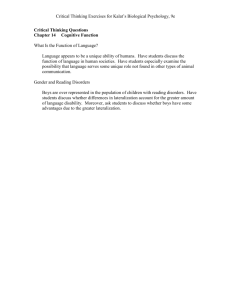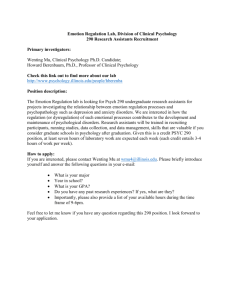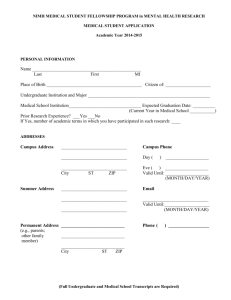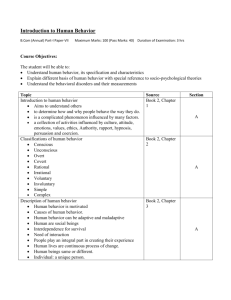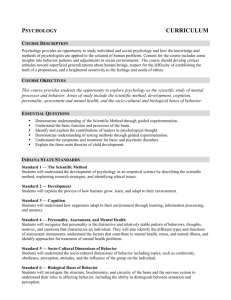Health and Human Dysfunction II - Argosy University Dissertation Site
advertisement
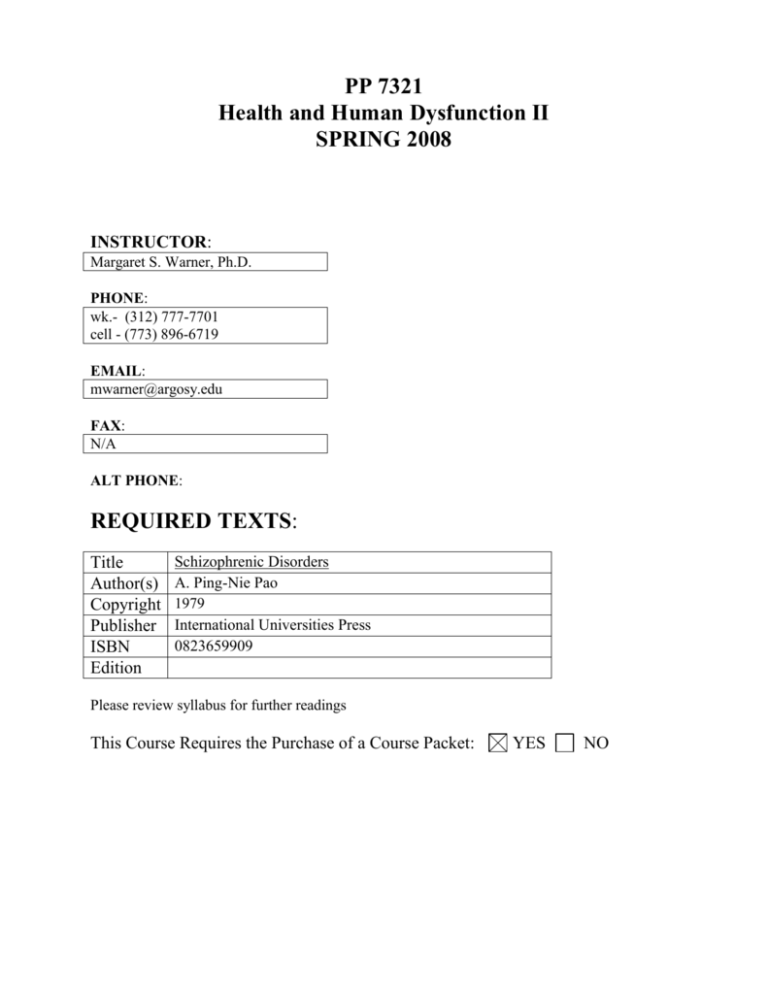
PP 7321 Health and Human Dysfunction II SPRING 2008 INSTRUCTOR: Margaret S. Warner, Ph.D. PHONE: wk.- (312) 777-7701 cell - (773) 896-6719 EMAIL: mwarner@argosy.edu FAX: N/A ALT PHONE: REQUIRED TEXTS: Title Author(s) Copyright Publisher ISBN Edition Schizophrenic Disorders A. Ping-Nie Pao 1979 International Universities Press 0823659909 Please review syllabus for further readings This Course Requires the Purchase of a Course Packet: YES NO PP7321: Health and Human Dysfunction II Dr. Warner Spring 2008 Page 2 General Course Description Health and Human Dysfunction II will explore a number of the more severe psychopathological disorders—focusing, in particular, on borderline and narcissistic character disorders, dissociative identity disorders, affective disorders, and the schizophrenias. This section has a particular emphasis on the comparison and critique of several core theoretical perspectives relating to the developmental basis of severe disorders, including orthodox psychoanalytic, object relations, self psychology and client-centered perspectives. Because of its presentation of the client-centered perspective in comparison to other developmentally-based perspectives, this class can be counted as one unit the ClientCentered and Experiential Psychology Minor. Grades will be based on an in-class midterm and final exam as well as a conceptual analysis paper. The midterm and final will count 33% each. The paper(s) will count 33% of the grade. The conceptual analysis assignment has several parts which will be due as follows: Feb 06: First draft of conceptual analysis paper Mar 19: Rewrite of conceptual analysis paper (Optional if the first draft received a grade of A- or better). The midterm will be on February 27; the final exam on April 9. Articles assigned are in the course packets or in assigned books. 1. The general readings packet can be purchased online by the usual procedure. 2. The packet of --Dr. Warner’s papers will be available for purchase in class. Handouts Relating to Theory Analysis and Critique will be given out in class. 3. The following books will be used as texts. A. Ping-Nie Pao, Schizophrenic Disorders (ISBN 0823659909; International Universities Press, 1979) B. One of the following three: Kay R. Jamison, Night Falls Fast (ISBN 0375701478; Vintage Books, 2000) OR Kay R. Jamison, An Unquiet Mind (ISBN 0-679-44374-6, 1996) OR Meri Nana-Ama Danquah, Willow Weep for Me: A Black Woman’s Journey Through Depression (ISBN 0-345-43213-4, 1998) PP7321: Health and Human Dysfunction II Dr. Warner Spring 2008 Jan 9 Page 3 Overview of the course; Child development and object relations theory; Culture, biology and psychology in relation to the identification of “improper persons” Required Lab Session (3:30-4:30 PM) Intro to conceptual analysis Readings: Cashdan, "Object Relations Theory: An Overview,” Krause, “Identifying Improper Persons” Jan 16 Introduction to borderline personality organization; Splitting and projective identification; Object relations views of aggression and client requests for boundary flexibility; Required Lab Session (3:30-4:30 PM) Conceptual analysis and clinical theory Readings: Koenigsberg, et al. (Eds.), Borderline Patients, Ch. 1; Ogden, "The Concept of Projective Identification"; DSM IV--Borderline Personality Disorder (On reserve). Recommended Readings: Koenigsberg Ch. 2 “Factors that Shape Borderline Personality Disorder”. Jan 23 Introduction to narcissistic personality disorders; Self Psychology theories of serious disorders; Interpretive vs. empathic approaches to character disorders; Self Psychology views of aggression and client requests for boundary flexibility Required Lab Session (3:30-4:30 PM) Essay form as a way of offering critical analysis of theoretical concepts Readings: White and Weiner, Ch 1: “An Overview of Basic Self Psychology Concepts" and Ch. 2 “Aggression From a Self Psychology Viewpoint”; Kohut, "The Role of Empathy in Psychoanalytic Cure"; Recommended: Stern, Ch's 1 & 2, The Interpersonal World of the Infant Jan 30 Client-Centered theory of psychopathology: Fragile process in relation to serious disorders; Empathic-relational ways of handling difficulties in the therapeutic relationship related to borderline and narcissistic issues; Personcentered views of aggression and of client requests for boundary flexibility; PP7321: Health and Human Dysfunction II Dr. Warner Spring 2008 Page 4 Ethical touch and client wishes and fears about sexuality Readings: Warner, ‘A Person-Centered View of Human Nature, Wellness and Psychopathology” Warner, "Person-Centered Therapy at the Difficult Edge" (Part 1); Feb 6 Psychodynamic, Object-relations, Self Psychology and Client-Centered responses to relationship difficulties that commonly emerge with narcissistic and borderline psychopathology; Role play of “theory clinics” Readings: Adler, "The Myth of the Alliance", Warner “Empathy, Relational Depth and Difficult Client Process; Stolorow, “Treatment of Borderline States” Conceptual Analysis Paper Due: (2-5 pages) Feb 13 Dissociative identity disorders; Trauma and dissociation in the history of psychology Readings: Masson, Ch's 2 and 3, ("Freud at the Paris Morgue" and "Emma Eckstein"); Warner “Person-Centered Therapy at the Difficult Edge" (Part 2); Recommended: Putnam, Multiple Personality Disorder, Ch's 2 & 3 Feb 20 Relationship issues and treatment dilemmas which emerge with dissociative identity disorders; Behavioral responses to disorders involving emotional dysregulation. Culturally-based misdiagnosis I: homosexuality and narcissism; Stigma and culturally-based fragile process. Readings: Isay, pp.11-66. Brown, D. ‘Pseudomemories’; Linehan, Ch 1; Feb 27 MIDTERM EXAM Mar 5 Intro to major affective disorders Readings: Jamison Night Falls Fast pp. 3-7, 52-69, or An Unquiet Mind or Danquah, Willow Weep for Me. Mar 12 Major affective disorders, (cont.); Culturally-based misdiagnosis II: genderbased preconceptions about mature emotional and relational style PP7321: Health and Human Dysfunction II Dr. Warner Spring 2008 Page 5 Readings: Jamison: Night Falls Fast, pp. 70-129; Arieti & Bemporad, Ch. 6, “Psychodynamics of Severe Depression”; Beck et al. “An Overview”. Mar 19 Intro to schizophrenic disorders. Psychodynamic approaches to schizophrenia Genetic and perinatal bases of schizophrenia; poverty and schizophrenia; Culturally-based misdiagnosis III: African-American “paranoia” Readings: Pao, pp. 3-40, 143-188; DSM IV--schizophrenia ; Green, “Neurocognition and Schizophrenia” Rewrite of conceptual analysis due. (Optional if initial grade is A- or better.) Mar 26 Schizophrenic disorders, cont. Person-centered approaches to treatment of psychosis and dementia. Readings: Prouty, pp. 35-87; Warner, ‘Luke’s Process’ Behavioral Approaches to Severe and Persistent Disorders;” Culturally- April 2 based misdiagnosis IV: Culture, dominance hierarchies and aggression Readings: Haddock et al. “Individual Cognitive Behavior Therapy in Treatment of Hallucinations and Delusions: A Review;” Linehan, Ch 1 “Borderline Personality Disorder: Concepts, Controversies and Definitions” Recommended: Carey and Carey “Behavioral Research on Severe and Persistent Mental Illness;” Early Intervention in Psychosis, Ch’s 1, 2, & 8 Apr 09 FINAL EXAM General Information Relevant to Health and Human Dysfunction II I. Catalogue Description The organization of this class follows the overall catalogue description for Health and Human Dysfunction II which reads as follows: PP7321 Health and Dysfunction II 3 Credit Hours PP7321: Health and Human Dysfunction II Dr. Warner Spring 2008 Page 6 The assessment, etiology, description, understanding and treatment of the more severe psychopathological disorders will be covered. Included in the study are schizophrenia spectrum, affective disorders, and borderline disorders. Different theories and empirical research on the etiology and treatment of these disorders will be included. Emphasis is on the recognition of the continuum of basic psychological processes in normal and severely disturbed experience. II.Contact Information Professor Margaret S. Warner, Ph.D. Phone : wk. (312) 777-7701 cell. (773) 896-6719 Teaching Assistant Brett Pearce (503) 860-4677 brettdpearce@gmail.com Office Hours: Thursdays 2:00-4:00PM (appointments preferred, other times available by arrangement) III. Criteria of Evaluation for Health and Human Dysfunction II Course Objectives: Objective I. The Health and Human Dysfunction II class aims to develop students’ understanding of a number of severe forms of human dysfunction, including borderline and narcissistic personality disorders, dissociative identity disorders, affective disorders and schizophrenic disorders. In particular, the class focuses on: 1. The basic diagnostic criteria for particular disorders 2. The history and theoretical premises behind major approaches to understanding each disorder 3. Analysis of case material from alternate perspectives, with consideration of ways that proponents of different perspectives might critique each others’ approaches Evaluation of Objective I: Two short-answer, in-class exams will be taken which count for 66% of the total grade for the course. Exams will focus on the three topic areas listed above. PP7321: Health and Human Dysfunction II Dr. Warner Spring 2008 Page 7 Objective II: Students will learn to do in-depth conceptual analysis and to utilize such conceptual analysis to analyze, compare and critique theories. This assignment aims to give students critical depth in their understanding of the particular theories relating to severe dysfunction and to develop critical thinking and writing skills relevant to the overall program of graduate work at ISPP/Chicago. Evaluation of Objective II Students will write a short “conceptual analysis” paper, analyzing and comparing the ways that two particular theorists use a central concept that is relevant to the understanding of severe disorders, as that concept is presented in a chapter or short passage. Most students will write two drafts of the conceptual analysis paper, and in the process will be get extensive feedback relevant to the revision of the paper. (If students get a grade of A- or better on the first draft, a second draft is optional.) The paper will be evaluated on the following criteria: 1. Clearly delineating the topic with a thesis statement. 2. Supporting the thesis with several supporting points which clearly relate to each other and to the thesis topic. 3. Supporting central points with careful and relevant citations from the text. 4. Developing a significant (i.e. non-obvious, non trivial) line of argument. 5. Development of a conceptual analysis (as opposed to some other sort of analysis). 6. Writing in ways that are clear and grammatical. The final draft of the paper will be graded and this will count as 33% of the grade for the course. IV. Relevant Argosy Policies Disability Policy If you feel that you have a disability that would interfere with your ability to participate in the Human Dysfunction II class or to complete course tasks as assigned, please talk to me at the beginning of the class (or earlier if possible). I will be glad to work with you in conjunction with the Disabilities Committee to see what alternate arrangements can be made within the context of the framework of the course. This course is organized in accordance with the overall Argosy University policy on accommodations for students with disabilities which reads as follows: It is the policy of the Argosy University, Chicago Campus to make reasonable accommodations for qualified students with disabilities, in accordance with the Americans with Disabilities Act (ADA). If a student with disabilities needs accommodations to complete the instructor’s course requirements, the student must notify the Director of Student Services. Procedure for documenting student disability PP7321: Health and Human Dysfunction II Dr. Warner Spring 2008 Page 8 and the development of reasonable accommodation will be provided to students upon request. Students will be notified by the Director of Student Services when each request for accommodation is approved or denied in writing via a designated form. It is the student’s responsibility to present the form (at his or her discretion) to the instructor in order to receive the requested accommodations in class. In an effort to protect student privacy, Student Services will not discuss the accommodation needs of any student with instructors. Academic Honesty/ Plagiarism This class is governed by the overall Argosy policy regarding honesty and plagiarism. If this policy is unclear in relation to any course assignments, please ask for clarification; The Argosy policy reads as follows: ACADEMIC DISHONESTY/PLAGIARISM STATEMENT The University seeks to foster a spirit of honesty and integrity. Any work submitted by a student must represent original work produced by that student. Any source used by a student must be documented through normal scholarly references and citations, and the extent to which any sources have been used must be apparent to the reader. The University further considers resubmission of a work produced for one course in a subsequent course or the submission of work done partially or entirely by another to be academic dishonesty. It is the student’s responsibility to seek clarification from the course instructor about how much help may be received in completing an assignment or exam or project and what sources may be used. Students found guilty of academic dishonesty or plagiarism shall be subject to disciplinary action up to and including dismissal from the University. Technology Argosy University encourages the use of technology throughout the curriculum. This course uses the following: audio and video tapes, on line syllabus and assignments, e-mail. V. Mission and History of ISPP/Chicago and of Argosy University Program Outcomes: The Doctoral program in Clinical Psychology at Argosy University Chicago Campus is an APA accredited program (APA, 750 First St. NE, Washington, DC 20002, 202-336-5500). This program is designed to educate and train students so that they may eventually be able to function effectively as clinical psychologists. To ensure that students are prepared adequately, the curriculum provides for the meaningful integration of theory, training and practice. The Clinical Psychology program at Argosy University Chicago Campus emphasizes the development of attitudes, knowledge, and skills essential in the formation of professional psychologists who are committed to the ethical provision of quality services. PP7321: Health and Human Dysfunction II Dr. Warner Spring 2008 Page 9 Specific objectives of the program include the following: Goal 1: Prepare professional psychologists to accurately, effectively, and ethically select, administer, score, interpret, and communicate findings of appropriate assessment methods informed by accepted psychometric standards and sensitive to the diverse characteristics and needs of clients. o Objective 1a: Accurately and ethically administer and score various psychodiagnostic instruments. o Objective 1b: Accurately interpret and synthesize assessment data in the context of diversity factors, referral questions, and specific objectives of the assessment, and organize and communicate results in writing and orally. o Objective 1c: Examine psychometric properties of psychological assessment instruments, and use that knowledge to evaluate, select, administer, and interpret psychological tests and measures appropriate for the client, the referral question, and the objectives of the assessment. Goal 2: Prepare professional psychologists to select, implement, and evaluate psychological interventions consistent with current ethical, evidence-based, and professional standards, within a theoretical framework, and with sensitivity to the interpersonal processes of the therapeutic relationship and the diverse characteristics and needs of clients. o Objective 2a: Synthesize the foundations of clinical psychology, including psychopathology, human development, diagnosis, diversity, ethics, and various therapeutic models in clinical applications. o Objective 2b: Select, plan, and implement ethical and evidence-based interventions with sensitivity to the diverse characteristics and needs of clients. o Objective 2c: Demonstrate knowledge, skills, and attitudes to effectively implement and participate in psychological consultation and supervision. Objective 2d: Demonstrate personal development and self-reflective capacity, including growth of interpersonal skills, and therapeutic relationships. Goal 3: Prepare professional psychologists to analyze the complexity and multidimensionality of human diversity, and demonstrate the knowledge, skills, and attitudes necessary to understand diverse worldviews and the potential meaning of social, cultural, and individual differences for professional psychological services. Goal 4: Prepare professional psychologists to examine the historical context and the current body of knowledge of biological, cognitive, affective, developmental, and social bases of human functioning. Goal 5: Prepare professional psychologists to critically evaluate the current and evolving body of scholarly literature in psychology to inform professional practice. The Master’s Program in Clinical Psychology has been designed to educate and train students to enter a professional career as MA level practitioners. Argosy University, Chicago Campus provides students an educational program with all the necessary theoretical and clinical elements that will allow them to be effective members of a mental health team. The program introduces PP7321: Health and Human Dysfunction II 10 Dr. Warner Spring 2008 Page students to basic clinical skills that integrate individual and group theoretical foundations of applied psychology into appropriate client interactions and intervention skills. In addition, the Program offers excellent preparation for those considering application to the Doctoral Program in Clinical Psychology. HISTORY AND PHILOSOPHY Argosy University was formed in September, 2001 by the merging of three separate academic institutions — the American Schools of Professional Psychology, the University of Sarasota, and the Medical Institute of Minnesota — and as a result offers general education and professional programs at the undergraduate, graduate, and postgraduate levels in behavioral sciences, business, education, and allied health care. Argosy University’s programs in psychology, the behavioral sciences, and health services emphasize a practical approach, built on a background in theory. The programs were formed following a movement begun in the early 1970s that called for a professional degree in clinical psychology emphasizing practical training and application of theory and research rather than the researchoriented approach of the traditional PhD degree. This effort ultimately led to the creation of the doctor of psychology, or PsyD, degree. Argosy University’s original campus, the Illinois School of Professional Psychology/Chicago, began granting the PsyD degree in 1979 and received candidacy status with the North Central Association of Colleges and Schools (NCA) in that same year. Accreditation was received in 1981. Because of demand, additional campuses were opened and new programs were added to complement and expand upon the PsyD program. Argosy University is now recognized as the country’s largest provider of postgraduate, professional doctoral degrees in clinical psychology. Argosy University’s programs in business and education also provide students with a solid practical and theoretical foundation. These programs, which for more than 30 years were offered at the University of Sarasota (formerly Laurence University), had a specific focus of providing educational opportunities at the graduate level to working adults without requiring them to sacrifice their professional or personal lives. This was accomplished through a unique delivery format involving a mix of distance learning and brief, on-campus study periods. In 1976, the state of Florida granted licensure to the University to offer the doctor of education (EdD). In 1990, the University was accredited by the Southern Association of Colleges and Schools (SACS) to offer master’s, and doctoral degrees, which was eventually expanded to include bachelor’s completion programs. The institution also found strong demand for its programs and delivery methods, adding new campuses and new programs, widening the opportunities for working professionals interested in pursuing postsecondary education. Argosy University’s programs in allied health care were established in 1961, beginning with a certificate-level medical laboratory technician program. The Medical Institute of Minnesota, originally known as Park Medical Institute, was founded to provide skilled allied healthcare personnel to hospitals and clinics. In 1963, the school officially became the Medical Institute of Minnesota (MIM). In 1970, MIM began granting an associate of science terminal degree. In 1971, MIM entered into a collaborative agreement with the University of Minnesota, General College, which agreed to grant associate degrees to students who had earned a certificate from MIM and had PP7321: Health and Human Dysfunction II 11 Dr. Warner Spring 2008 Page satisfied the degree requirements of the General College. New programs were added, and MIM now offers eight programs in the allied health fields, including veterinary technology, dental hygiene, and medical technology. In 1980, the school applied for and was granted initial institutional accreditation with the Accrediting Bureau of Health Education Schools (ABHES). All allied health programs are at the associate degree level, granting either the associate of applied science (AAS) or the associate of science (AS) degree. As of September 2001, the former American Schools of Professional Psychology, the University of Sarasota, and the Medical Institute of Minnesota merged to form Argosy University. REGIONAL ACCREDITATION Argosy University is accredited by the Higher Learning Commission and is a member of the North Central Association of Colleges and Schools. (NCA, 30 North LaSalle Street, Suite 2400, Chicago, IL 60602, 800-621-7440, www.ncahigherlearningcommission.org). STATE APPROVAL Argosy University is authorized to offer degree-granting programs in each of the states in which the institution operates a campus.

